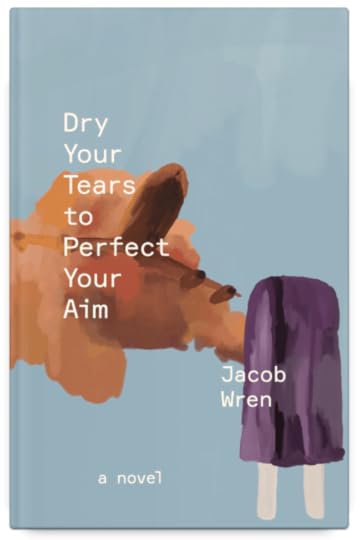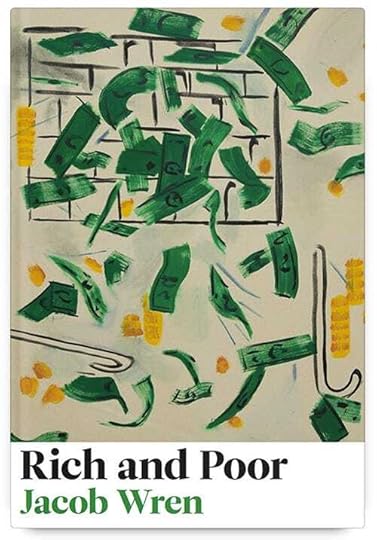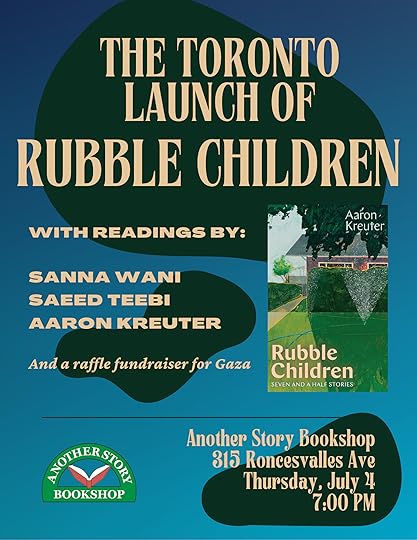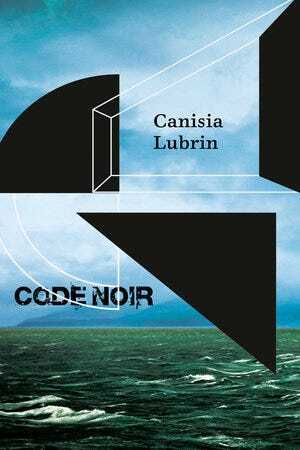Kathryn Mockler's Blog, page 26
July 26, 2024
Jacob Wren | Issue 39
1: My Apologies
Dropping bombs is the purest form of capitalism. A Tomahawk missile costs US$1.87 million. An AGM-114 Hellfire costs US$150,000. The price of a GBU-44/B Viper Strike is currently unlisted but is likely also somewhere in this range. And the moment they hit the ground, the moment they detonate, the money is gone and you must buy new ones in order to do it all over again. A computer lasts from three to five years. A car lasts eleven. But a bomb, when you use it, lasts a split second and it’s gone. A bomb that kills many and a bomb that kills no one costs the same amount. It is not like throwing good money after bad or watching money burn. It’s like watching money detonate, watching money explode, like a Hollywood film in which the many explosions make up for the shortcomings of the script, filling in for absences of meaning and purpose.
The term planned obsolescence is generally attributed to the industrial designer Brooks Stevens, who used it as the title of a 1954 talk. Wikipedia says Stevens defined it as “instilling in the buyer the desire to own something a little newer, a little better, a little sooner than is necessary.” His view was to always make the consumer want something new, rather than to create poor products that would need replacing. But you do not need to wait for a bomb or missile to wear out or become obsolete, or for a newer, better one to arrive on market. Instead they incinerate themselves as an expression of their use. Profit and obsolescence meld into one indistinguishably violent act.
I’m ashamed I decided to take this trip. The moment I got on the first plane, I already knew it was a mistake. That by simply deciding to take this trip I was more part of the problem I hoped to solve than the solution I hoped to become. I paid taxes in a country that was involved in between seven and nine wars, depending on who you asked. My tax money went to pay for a minuscule fraction of the aforementioned bombs. In each of these seven to nine declared and undeclared wars, hundreds if not thousands of such bombs were detonated every year.
I felt a certain powerlessness—I could only read about these wars, only imagine them, had no idea what they were actually like, what it might feel like to be there, to put one’s life on the line. For some reason, despite my severe and often literary depression, I did not have the courage to kill myself. But if a bomb that my tax dollars had a very small part in creating were to fall on me, there might be a strange kind of justice to it, as if something had come full circle. And if not, hopefully I would still learn about a situation that, against every ethical desire I held dear, I still played some small (well, minuscule) part in funding. I look around: almost everyone else is asleep. I’ve always envied people who could sleep easily on planes, always thought they were less tormented than me. I suppose most people are less tormented than me. I do not believe this is a contentious statement.
As I go through customs, they look at my passport, then ask the purpose of my trip. I say, “Tourist.” They look skeptical, replying that no one comes to sightsee war. I think: that’s probably not even true. I’m sure that every time there’s a war, all sorts show up to have a quick look. To risk their lives in search of adventure. But that’s not what I say. With no idea whether it is wise or unwise, I spontaneously decide that it is better to lie, so I say that some of my ancestors had lived here, and I wanted to see what it looked like before it was completely destroyed. From the expression on the customs officer’s face I cannot tell if he likes this answer, or if he believes me, or if he simply wanted a bribe. I rarely lie, and after I get through, I ask myself long and hard why I had chosen this particular moment to do so. In retrospect, it seems stupid to tell a border official that his hometown will be completely destroyed. And needlessly cruel, ignorant. I now wish I’d said something else.
I have one friend here. (Perhaps another reason for my trip.) She kindly picks me up at the airport. I am exhausted after the long flight. In the car, we drive through bombed-out streets. The amount of destruction is almost breathtaking. I realize I’ve never seen anything like this and don’t know how to react. I stare out the window of the beat-up car. You had to be a complete asshole to come here only because you wanted to see all this for yourself, but I thought it was even worse to ignore it, to pretend it wasn’t happening or it didn’t exist. I could have come as part of a humanitarian project, to help people, feed them or rebuild their houses, but it hadn’t occurred to me until now. In the car we don’t talk, I just stare out the window. For no specific reason, I begin to cry.
In her small apartment we begin to make dinner. We haven’t seen each other in a long time. She moved back here to look after her ailing parents. Now both her parents are gone, but she has stayed. When I wrote to tell her I was coming, she was obviously surprised, so surprised I might even describe it as shocked. In her reply, she said she remembered me as someone who never travelled except for work. This is still basically true, and yet now I seem to be making an exception. In that same reply she also said something that is now burned into my mind. She said that every single day she thinks of leaving. Of becoming yet another name on the list of an ongoing refugee crisis. That every day she’s afraid for her life. But, at the same time, she feels there are things she can do here that are more important than what she can do anywhere else in the world. How she never realized home was home until its daily reality was under threat.
Over dinner we talk about surface things. People we used to know, where they are now, what they are up to. Books we’ve read, movies we’ve seen. We’re both dying to talk politics but neither of us dares. I don’t have many friends. When I was younger I had friends, but so many of them have moved away and I never managed to make new ones. I have stayed in touch with almost everyone who moved, but only in a perfunctory, minimal way. When we see each other we catch up, much like we’re doing now. I wonder, if I were to die here, how long it would take anyone to notice. Eventually someone would, but it might be a while. I didn’t tell anyone I was doing this. No one knows but me, the border guard, and my old friend sitting at the table across from me.
I try, I do my best, to explain the reasons for my trip, and I can tell right away that she doesn’t like it. I knew she wouldn’t. She says she’s never heard such a stupid example of misguided thinking. I know she’s right but also feel there’s something she doesn’t see. Some reason that I have to do this that neither of us will ever understand. What I’m saying suddenly feels mystical to me, and I’ve never before thought of myself as mystical. She tells me I should get on a plane and go home, protest against my own government back there, or fight to replace them with something—anything—better. If I want to do something, those are causes worth dedicating your life to. Not come here to experience first-hand the violence almost everyone else she knows would give almost anything to escape. I know she’s right. But I feel as helpless at home as I feel here, as unable to change anything about my government as I am to make all wars stop. Knowledge is experiential. I already know what it’s like at home. I need to know something else, perhaps feel my life at risk, perhaps even let it go and find out if that changes anything. She’s disgusted by my explanations. She tells me it’s the most sickeningly apolitical thing she’s ever heard. I wonder if I think what I’m doing here is political. It’s agitated by political reflections but, if I’m honest with myself, it has more to do with being depressed.
In the morning we have breakfast and continue our disagreement. Over the night, a new thought has occurred to her. That I’m not just here to stupidly risk my life and take in the suffering of others—a suffering I feel partly responsible for but also don’t know how to stop—but that I’m also hoping to make a book out of it. It is so obvious, she doesn’t know why it didn’t occur to her before. She tells me, almost as a confession, that she’s always liked my books, that she feels I try to write about these questions in complex ways, to write my way out of my own political paralysis. But my books have always been works of pure imagination. I’ve written about suicide but never put my life at risk, as far as she knows I’ve never tried to kill myself. I’ve written about revolutions but never tried to make or join one. Why now? As works of pure imagination, my books were productive and perhaps energizing. But I’m only a tourist here, and no matter how much I observe, I will never get it right. I can’t write her experience, much less the experiences of so many here who have it so much worse or who have already been killed or martyred.
However, if there’s one thing I truly know in this moment, it’s that I’m not here to write about it. I didn’t come here to write about the experience. For a brief moment I lost my mind, bought a plane ticket. Because I wanted to see for myself. And now that I’m here I have to go through with it. I remember an interview I read a long time ago with a writer, about their first book, how they said they were writing it in order to “stay alive,” to keep despair at bay and in the process save themselves. That is also what writing has most often been for me. But this is something else. I’m not here to write about it. I’m here to experience something first-hand for once in my fucking life. To get something about the world. Something I’m complicit in but have never felt and therefore don’t think I really understand. Or, to put it more concisely, tentatively, and against all reason: I have some small hope this experience will change my life. Like going to the casino and betting one’s entire life savings on a single number: either you lose everything or you win in some way you’re barely even able to imagine.
So often, when I argue, I get nowhere. We both dig in our heels, double down on our positions. I want to listen to her deeply, feel that I’m really listening, let her persuade me, but I already agree with so much of what she’s saying. I tell her I understand her position, she laughs and looks at me almost in disgust, and I suggest we put it aside for now and go for a walk. She doesn’t reply, but from the way she continues to stare at me I understand that one doesn’t simply “go for a walk” here. It is too dangerous. She continues to stare at me, wondering what she could say to change my mind, to knock some sense into me. I ask her if we’re still friends and she says that we are. That she’ll write about what good friends we used to be when she writes my obituary. I laugh and say I’ll go for a walk myself and she shouldn’t worry. Then she says that she is worried. That she’s worried precisely because she’s my friend. And that she’s never thought of me as a person who knows a lot about friendship, but when you have a friend, you don’t want them to die. And you especially don’t want them to die stupidly, by strolling into a war zone, in a way that could so easily be avoided. But she can also see that I’m lost, she’s always thought of me as lost, but I’m more lost now than back when she knew me. She can see that I’m lost, that I’ve painted myself into a corner, and there’s an Italian expression I’m reminding her of right now: when you’re painted into a corner, sometimes the only thing to do is shoot yourself in the foot. She just hopes I shoot myself in the foot and not in the head.
Out on the street, life is muted but goes on. It’s true no one seems out for a casual stroll, but people are out on the street regardless, walking briskly, doing the things they have to do, going from place to place. There are even a few children playing, but few enough that I assume other children have been told to stay inside. Some of the people stare at me, I suppose wondering if I’m a soldier in civilian clothes (I assume I don’t look much like a soldier), and if I’m not a soldier, what the fuck am I doing here, wandering at a pace considerably more casual than anyone else on the street, a flâneur on streets inhospitable to such activities. A formation of planes flies above, and everyone starts walking a bit faster, heading for cover yet without any real panic, as I stop in my tracks and watch the sky. I know nothing about planes, but these ones don’t appear primed to attack, seem to be in transit, off to attack someone else a little farther along. They move smoothly through the serene blue sky, and just then, as I’m watching, one of the planes in the formation explodes. I see no reason for it. There are no shots fired, nothing under attack, nothing but five planes in the air, a ball of flame, a trail of smoke, and then there were four. No one else on the street seems especially interested or perturbed by what we just witnessed—business as usual. They’ve seen it all and they’ve seen it all before. But I think, in the distance, I hear a few voices cheer.
When I get back to her apartment I tell my friend about what I saw, about the plane that exploded in mid-air. She doesn’t seem particularly interested, instead wants to continue our conversation about what I’m about to do. We argue more, but unlike before, now when we argue we also laugh. I think, while I was on my walk, she decided that if I was going to die we should at least have some good times together before I go.
That night she took me to a secret, illegal art party. I was surprised that she was unsurprised by the warplane I had seen explode. She told me it happens regularly and no one knew what to make of it. I felt there was something exciting about the phenomenon, that it presented possibilities, or at least promising questions, but my friend wasn’t so sure.
To get to the party, we drove to a suburb of a suburb. Several times, as we drove, we heard planes overhead, and each time we heard that sound we drove just a little bit faster. We parked by a fence, climbed over it (I ripped my pants as we did so), then walked for a long time, I would guess almost an hour. There was a door with a password, another door with a different password, and then stairs going down and down and down. After such a long journey I was thinking that no party could possibly be good enough to make it worth this endless travel but I was wrong. I had no idea what I was talking about.
On our walk I asked again about the exploding planes. She told me the rumour she had heard was that about one plane was exploding every other day. And strangely, it seemed it was democratic, not only planes from any particular government or army or faction. Planes from all countries appeared to be exploding more or less equally. We talked about whether it could be a computer virus, perhaps a computer virus that had gotten out of hand, spread beyond its original target, or another form of sabotage. My friend didn’t discount these possibilities—in fact, she didn’t discount any possibilities, any explanation might be possible—but I couldn’t help but feel she wasn’t particularly interested in the explanation. For her it was happening and that was all, another mad thing in this endless series of madnesses called war and colonization.
“But don’t you think it’s actually great,” I asked her, unable to understand her patient lack of excitement.
“It might be great,” she replied, “I don’t know. The longer I live here, the more suspicious I become. I don’t want to get my hopes up if they’ll only be dashed a few days later. And also, the pilots…they might be enemy pilots, they’re definitely killing us much more, a lot more indiscriminately, than we’re killing them. But I don’t know why, I find myself not wanting to rejoice in the deaths of those enemy pilots. I’m afraid of becoming obsessed with revenge. I mean, the longer I live here, the more I’m becoming obsessed with revenge, and therefore the more I try to counterbalance it by not rejoicing in these pilots’ deaths.”
“I’m not talking about revenge,” I say. “I’m talking about curiosity, about wanting to know why.”
“The planes are exploding. Whether or not we know why, they’re exploding.”
I say nothing. I still didn’t understand.
Stepping into that party, into the first room, I felt something opening up. A sense of possibility I don’t think I’d felt in a very long time. Then I immediately started feeling guilty, as if I was here to experience a meaning I was unable to experience at home but that I was getting without the daily pain that made it possible (though perhaps the pain would come later). I walked into the middle of that first room and froze. Things were happening all around me, I could also hear other things happening in the further rooms, and I still hadn’t gotten my bearings. Frozen in the middle of that room, it was as if I split into two, as if one part of me had broken off and floated toward the ceiling with the intention of giving the other part a lecture. The lecture was as follows: Now is not the time to feel guilty or beat yourself up. There will be plenty of time for that later. When you stepped into this room, you had an experience of opening. When was the last time you had an experience of opening? Don’t throw that away for a wallow in cheap guilt. Your friend brought you to this party, you don’t have a lot of friends, take it in and enjoy it. You might be dead tomorrow and never have another chance. It was a good lecture, good self-advice, and I did my best to listen, though I don’t think I entirely succeeded.
Excerpt from Dry Your Tears to Perfect Your Aim © 2024 by Jacob Wren. Used with permission of Book*hug Press.Jacob Wren makes literature, performances, and exhibitions. His books include Revenge Fantasies of the Politically Dispossessed; Polyamorous Love Song (finalist for the Fence Modern Prize in Prose and a Globe and Mail best book of 2014); Rich and Poor (finalist for the Paragraphe Hugh MacLennan Prize for Fiction and a Globe and Mail best book of 2016); and Authenticity is a Feeling. He is artistic co-director of the Montreal-based interdisciplinary group PME-ART. Wren lives in Montreal. Text within this block will maintain its original spacing when published
Dry Your Tears to Perfect Your Aim
by Jacob WrenBook*hug Press, 2024
Text within this block will maintain its original spacing when published
Dry Your Tears to Perfect Your Aim
by Jacob WrenBook*hug Press, 2024What are the best ways to support political struggles that aren’t your own? What are the fundamental principles of a utopia during war? Can we transcend the societal values we inherit? Dry Your Tears to Perfect Your Aim is a remarkably original, literary page turner that explores such pressing questions of our time.
A depressed writer visits a war zone. He knows it’s a bad idea, but his curiosity, and obsession that his tax dollars help to pay for foreign wars, draw him there. Amidst the fighting, he stumbles into a small strip of land that’s being reimagined as a grassroots, feminist, egalitarian utopia. As he learns about the principles of the collective, he moves between a fragile sense of self and the ethical considerations of writing about what he experiences but cannot truly fathom. Meanwhile, women in his life—from this reimagined society and elsewhere—underscore truths hidden in plain sight.
In these pages, real world politics mingle with profoundly inventive fabulations. This is an anti-war novel unlike any other; an intricate study of our complicity in violent global systems and a celebration of the hope that underpins the resistance against them.
Praise for Dry Your Tears to Perfect Your Aim
“By turns a revolutionary’s memoir, an adventurer’s journal, autofiction, and speculative fiction, yet Dry Your Tears to Perfect Your Aim always stays clear and committed to its searching style, and this makes it a novel for today’s uncertain world.” —Kaie Kellough, author of Dominoes at the Crossroads
“A stunning thought experiment where our hypocrisy, culpability, and compassion are all exposed, Dry Your Tears to Perfect Your Aim is a thought-provoking work of secular expiation, a knowing knot of courage and its opposite, and a defiant work of desperate grace.” —Eugene Lim, author of Search History
Support Send My Love to AnyoneSupport Send My Love to Anyone by signing up for a monthly or yearly subscription, liking this post, or sharing it!
Big heartfelt thanks to all of the subscribers and contributors who make this project possible!
ConnectBluesky | Instagram | Archive | Contributors | Subscribe | About SMLTA
July 10, 2024
Flowers are Tragic
Support Send My Love to Anyone by signing up for a monthly or yearly subscription, liking this post, or sharing it!
Big heartfelt thanks to all of the subscribers and contributors who make this project possible!
ConnectBluesky | Instagram | Archive | Contributors | Subscribe | About SMLTA
July 8, 2024
Sealed Containers
Support Send My Love to Anyone by signing up for a monthly or yearly subscription, liking this post, or sharing it!
Big heartfelt thanks to all of the subscribers and contributors who make this project possible!
ConnectBluesky | Instagram | Archive | Contributors | Subscribe | About SMLTA
July 5, 2024
Guest on Tim Blackett & Friends
Thanks so much to Tim Blackett for inviting me on his podcast to discuss my story collection Anecdotes (Book*hug Press) and other random things like TikTok and favourite email salutations!
Support Send My Love to AnyoneSupport Send My Love to Anyone by signing up for a monthly or yearly subscription, liking this post, or sharing it!
Big heartfelt thanks to all of the subscribers and contributors who make this project possible!
ConnectBluesky | Instagram | Archive | Contributors | Subscribe | About SMLTA
Widow Fantasies by Hollay Ghadery
A clock on the wall flickers and sticky handprints scuttle across the window, a sheet of muted light—an oceanview, if you’re sinking to the bottom of an ocean.
from Widow Fantasies (Gordon Hill Press) by Hollay Ghadery
This was the blurb I wrote for Hollay Ghadery’s story collection:
In these tight, sharp-witted, and expertly crafted stories, Hollay Ghadery distills the scope of an entire relationship or, in some cases, an entire lifetime into a single scene.
Vignette doesn’t quite capture the breadth of these extraordinary flash worlds inflected with wry humour, incisive observation, and heartbreak.
While a comedic title, line, or situation is often the hook—whether it’s a woman repelled by the smell of her oblivious husband’s bathroom ritual or a drunk divorcee talking to patio furniture—Ghadery’s characters are multi-faceted. Where there is despair there is also love; where there is anger, there is also insight; and where there is grief, there is also friendship, which gives these stories their depth and heart.
Readers of George Saunders or Joy Williams will enjoy Widow Fantasies, a spectacular and unforgettable collection.
 Text within this block will maintain its original spacing when published
Widow Fantasies
by Hollay GhaderyGordon Hill Press, 2024
Text within this block will maintain its original spacing when published
Widow Fantasies
by Hollay GhaderyGordon Hill Press, 2024Fantasies are places we briefly visit; we can’t live there. The stories in Widow Fantasies deftly explore the subjugation of women through the often subversive act of fantasizing. From a variety of perspectives, through a symphony of voices, Widow Fantasies immerses the reader in the domestic rural gothic, offering up unforgettable stories from the shadowed lives of girls and women.
Support Send My Love to AnyoneSupport Send My Love to Anyone by signing up for a monthly or yearly subscription, liking this post, or sharing it!
Big heartfelt thanks to all of the subscribers and contributors who make this project possible!
ConnectBluesky | Instagram | Archive | Contributors | Subscribe | About SMLTA
Rich and Poor by Jacob Wren
"What we don't want to look at, we think we don't have to deal with, and then it owns us completely."
—from the novel Rich and Poor by Jacob Wren
I recently re-read, Rich and Poor, Jacob Wren’s 2016 unbelievably fucking relevant novel about a classical pianist turned dishwasher who wants to kill a billionaire.
The novel switches point of view between the billionaire and his aspiring assassin.
In one especially hilarious section, the billionaire reflects on the poet who turns on him after winning his prestigious poetry prize:
He is only a poet, and I am a billionaire, and I know at the end of the day there is no real way he can hurt me. He has no public voice, only a few readers, while I have every newspaper in the free world. That's why we chose to sponsor a prize for poets and not a prize for movie actors, who wouldn't need the extra money anyways, but would always be happy to receive any extra attention.
In this moment of exceptional corporate greed where most are struggling with the basic necessities, this is a revenge-fantasy novel that is truly satisfying to read.
 Text within this block will maintain its original spacing when published
Rich and Poor
by Jacob WrenBook*hug Press, 2016Support Send My Love to Anyone
Text within this block will maintain its original spacing when published
Rich and Poor
by Jacob WrenBook*hug Press, 2016Support Send My Love to AnyoneSupport Send My Love to Anyone by signing up for a monthly or yearly subscription, liking this post, or sharing it!
Big heartfelt thanks to all of the subscribers and contributors who make this project possible!
ConnectBluesky | Instagram | Archive | Contributors | Subscribe | About SMLTA
July 3, 2024
On Blurbs
Sharing some of my insights into the blurb business—on asking for and writing blurbs.
Whether you’re with an micro, small, mid-sized, or one of the big five, you generally are going to have to ask for a blurb. A publisher will do it for you, but if the ask is coming from the publisher, the rejection is easier which is why writers are encouraged to ask.
I don’t know a single writer who enjoys asking for blurbs. We enjoy getting blurbs from writers we admire but asking is hell! For me, it is the only part of the book publishing process that I absolutely hate.
A writer I admire advised me when I was complaining about blurbs to go blurb free.
Blurb free! What freedom! What a good idea!
However, when I broached the subject with my publisher, it was a no go, which I understand.
Blurbs are a marketing tool. They help place and position a book. For most writers, they are necessary. I hadn’t had a solo book out in eight years and mine was a debut story collection. Therefore, it was agreed, I needed blurbs.
I do not like asking anyone for anything. I never hit up friends for favours, and I don’t generally ask for help.
Also I’m not good with compliments on a good day and asking for a blurb is like saying hey will you do a bunch of work for me for free and then say something nice in your spare time of which I’m sure you have none.
Asking for blurbs is like facing the worst insecurities you have about yourself and your writing.
Blurb RejectionRemember not everyone you ask is going to be able to write you a blurb.
Many writers are overrun with blurb requests and can’t do them all or they’d never have time to do anything else. First in line for them are likely going to be friends, former students or writers they’ve mentored, and their publisher requests. In other words, people they feel some obligation to.
Some writers have a no-blurb policy or have a set limit of how many blurbs they will write in a year.
Also writers may agree to the blurb but aren’t able to follow through for any number of reasons—over-commitment or maybe they just didn’t like your book and don’t want their name on it. Fair enough.
Although it’s hard, try not to take it personality.
One way to avoid blurb rejection is to make sure that you are asking the right person and in a way that sets you up for blurb success.
The AskYour chances of a writer agreeing to a blurb, occurs in the who and the how of the ask.
Is this an appropriate person to ask for this book at this point in time?
Like a good reference request, the blurb asking should make some kind of sense to both you and the person being asked.
Perhaps you know the writer or have worked with them in some capacity. Maybe they published your work or were your professor or ran a workshop you participated in or were a writer-in-residence at your school or library. Maybe they’re a friend. Ideally you have some relationship with the person you are asking. This is of course easier if you’ve been around the scene for a while.
If you don’t know the writer and have few literary connections, it might be easier for your publisher to do the contacting. In any case, ensure your work connects to the author or poet’s work in some way—in genre or subject matter or theme and explain that in your request. Let them know that you’ve read their work and you are asking them not just for their name but because of the way the content of their work relates to yours or how their writing influenced theirs.
You’re asking for a blurb in hopes of tapping into a writer’s audience, so it should be apparent why. If it’s not clear to the writer you are asking or even to you, then perhaps you haven’t picked the right person.
Give the writer a lot of lead time and be clear about deadlines.
It’s a good to ask for more blurbs that you might need as someone might agree and then not be able to do it after all.
Once the book has been sent, it’s appropriate to follow up once or twice if you haven’t heard back in a while or if the deadline has passed, but then you just have to let it go if you don’t get your blurb. Some people don’t want to reject or say they didn’t like your book so they ghost instead.
On the Other Side of ThingsSome writers—especially if they’ve recently received attention for their own work—are going to be inundated with blurb requests.
And they are going to have to say no.
No question.
One cannot agree to write blurbs for every ask.
Best practise is to just say no right away, so the writer can move on to the next request.
How To Write a BlurbWriters have many different approaches to blurbing but this is my way of doing it.
I won’t blurb a book unless I’ve read the whole thing. I’ve heard that sometimes people read a few pages and then write a line or two, but I just can’t do that.
First of all, I’m in the small press business, so for me it’s important to support books I can get 100% behind and to be completely authentic in my endorsement.
If I read a book and don’t like it, then I wouldn’t blurb it. So far that hasn’t happened!
My ProcessMy process is laborious which is why I can only do a couple a year. I treat the blurb essentially like it’s a mini review. I generally go a little longer so that the writer and publisher have some options like trimming the blurb down or using parts of the blurb for various purposes such as a line for the back cover and the longer blurb for the website.
As a blurb writer I do this to be generous but also if I am spending this much time on a blurb, I want it to be used.
Poetry and short fiction can be a little harder to blurb than a novel because they are often made of different elements, themes, styles. Trying to find something cohesive to say about them as a whole can be a little more challenging than say a novel or work of nonfiction.
I generally read the book thoroughly once and sometimes twice (especially if it’s poetry) so I’m very familiar with the work. If it’s a story collection, I make a note about each story which includes a brief summary, a theme word, and my personal impression with an adjective or two. For poetry I write notes about the poems as I go along but not necessarily every single poem. For novels I make plot, theme, character, and impression notes as I read. These notes are very helpful when it comes down to writing the blurb and make the process go faster for me.
I see blurbs as a cross between a positive review and a reference letter. The blurbs I write generally include some form of description of the book, then a couple of lines of praise picking up on key themes or voice or something that resonated with me personally about the book or the writing. I like to back up my praise statements with a description or something concrete from the book. And often I will list a comparable writer or two if appropriate.
The blurb I wrote for Kirby’s book, She was unusual! Instead of writing a traditional blurb, I wrote a poem in the syllabic style of the book using phrases from Kirby’s poems. This was a little risky but very fun.
Here’s a recent blurb I wrote for Hollay Ghadery’s new short story collection, Widow Fantasies. Hollay received many wonderful blurbs so you can see a range of styles in her blurb list as well.
What are your thoughts on blurbs? Love them? Hate them? How do you ask for them or write them?
Support Send My Love to AnyoneSupport Send My Love to Anyone by signing up for a monthly or yearly subscription, liking this post, or sharing it!
Big heartfelt thanks to all of the subscribers and contributors who make this project possible!
ConnectBluesky | Instagram | Archive | Contributors | Subscribe | About SMLTA
July 2, 2024
Send My Love to Anyone | Issue 38
Hello friends,
In Issue 38 of Send My Love to Anyone, you’ll find two short stories from Hollay Ghadery’s forthcoming collection Widow Fantasies and a story from Aaron Kreuter’s new book Rubble Children.
And I share a flash fiction story, The Labrador Retriever, in On My Mind.
In Gatherings, I have posted some photos from the Trillium Awards and mine and Kirby’s reading at Another Story Bookstore! Our first reading together! It was sweet!
Also in Gatherings, I recommend Kim Fahner’s review of She, Andrea Long Chu on Rachel Cusk, Canisia Lubrin's Code Noir, Work in a Warming World Call for Submissions, and more!
Hope you enjoy!
Kathryn
Send My Love to Anyone is a reader-supported publication. To receive new posts and support this project, consider becoming a free or paid subscriber.
He said he’d be back in a minute but he’s been gone for hours. Now baby’s blue eyes are pooling black and when she opens her mouth to laugh, I see her bottom two teeth have multiplied, lining the back of her throat like pebbled coral. She sits in her diaper on her playmat, blocks and board books scattered. She watches when I push m…","size":"lg","isEditorNode":true,"title":"Hollay Ghadery | Issue 38","publishedBylines":[{"id":21201715,"name":"Kathryn Mockler","bio":"Kathryn Mockler is the author of Anecdotes (Book*hug Press) which was a finalist for the 2024 Trillium Book Award and shortlisted for the 2023 Danuta Gleed Literary Award. She teaches creative writing at the University of Victoria.","photo_url":"https://substack-post-media.s3.amazon... My Love to Anyone","publication_logo_url":"https://substackcdn.com/image/fetch/f... Aviv—Toronto Red Eye: A Dialogue
Dear Stephanie: Congratulations! We’ve decided to accept your short story “Tel Aviv—Toronto Red Eye” for publication in Moose and Seal. One of our senior editors will write you shortly with some minor editorial suggestions. Sincerely, Chelsea Smith Fiction Editor","size":"lg","isEditorNode":true,"title":"Aaron Kreuter | Issue 38","publishedBylines":[{"id":49838061,"name":"Aaron Kreuter","bio":"Reader. Writer.","photo_url":"https://substackcdn.com/image/fetch/f... More Abysses, No More Walls","primaryPublicationId":511889}],"post_date":"2024-06-06T21:12:47.355Z","cover_image":"https://substackcdn.com/image/fetch/f... My Love to Anyone","publication_logo_url":"https://substackcdn.com/image/fetch/f...
A woman went to the SPCA looking for an animal to adopt, and while she was there, a man came in with a Labrador Retriever he was surrendering because he could not properly take care of him. He even admitted that he hit the dog from time to time.","size":"md","isEditorNode":true,"title":"The Labrador Retriever ","publishedBylines":[{"id":21201715,"name":"Kathryn Mockler","bio":"Kathryn Mockler is the author of Anecdotes (Book*hug Press) which was a finalist for the 2024 Trillium Book Award and shortlisted for the 2023 Danuta Gleed Literary Award. She teaches creative writing at the University of Victoria.","photo_url":"https://substack-post-media.s3.amazon... My Mind","id":146229550,"type":"newsletter","reaction_count":0,"comment_count":0,"publication_name":"Send My Love to Anyone","publication_logo_url":"https://substackcdn.com/image/fetch/f... Send My Love to Anyone
Support Send My Love to Anyone by signing up for a monthly or yearly subscription, liking this post, or sharing it!
Big heartfelt thanks to all of the subscribers and contributors who make this project possible!
ConnectBluesky | Instagram | Archive | Contributors | Subscribe | About SMLTA
The Labrador Retriever
A woman went to the SPCA looking for an animal to adopt, and while she was there, a man came in with a Labrador Retriever he was surrendering because he could not properly take care of him. He even admitted that he hit the dog from time to time.
When the woman heard this she winced and immediately fell in love with the dog and adopted him. The man was grateful and left the animal shelter.
After a few weeks with the dog, the woman discovered that she didn’t like the Labrador Retriever as much as she thought she would. He had an okay personality, but over time her feelings diminished, and she deeply regretted adopting him. It wasn’t the dog; it was her.
She was thinking of finding him a new home when she ran into his previous owner on the street while taking the dog for a walk.
The dog was excited to see his previous owner and the previous owner was excited to see him. They played and wrestled and the Labrador Retriever licked his previous owner’s face. The sight of it brought tears to the woman’s eyes.
They missed each other and wanted each other back.
So she handed the previous owner the leash and said, “Take him,” all the while keenly aware of the reasons he had given up the dog in the first place.
Thank you for reading Send My Love to Anyone. This post is public so feel free to share it.
Kathryn Mockler is the author of Anecdotes (Book*hug Press).Support Send My Love to AnyoneSupport Send My Love to Anyone by signing up for a monthly or yearly subscription, liking this post, or sharing it!
Big heartfelt thanks to all of the subscribers and contributors who make this project possible!
ConnectBluesky | Instagram | Archive | Contributors | Subscribe | About SMLTA
Gatherings | Issue 38
Here are some photos from the reading Kirby and I did at Another Story Bookstore! Kirby read from their new poetry book, She, and I read from Anecdotes!
It was our first time reading together ever!
Kirby made this sweet video about our friendship. Everyone should be so lucky to have such a dear dear friend.
It was a wonderful evening! Thanks everyone for coming out on such a hot day!
Thanks to the Trillium Book Award judges Souvankham Thammavongsa, Donna Bailey Nurse, and Shawn Micallef for including Anecdotes (Book*hug Press) on the list of finalists!
Congrats to all of the finalists and winners.
I hate getting my picture taken, but I tried to be a good sport.
Hats off to these judges who read 321 books! Wow!
I got a nice unexpected finalist cheque from Ontario Creates which I will be donating to Amnesty International and RAVEN’s campaign for the Grassy Narrows First Nation lawsuit against Canada and the Ontario government and Human Concern International’s initiative to sponsor Palestinian orphans.
I have an acid story (an excerpt from Anecdotes) in Issue 126 of Geist Magazine with an amazing group of writers Gary Barwin, Lisa Whittington-Hill, Evelyn Lau, and more amazing writers!
Fun fact! The last time Gary and I were in the same issue of Geist was during the Great Canadian haiku controversy which you can read about on Send My Love to Anyone.

Thanks to Nancy Guitar for interviewing me for her podcast Small Talk with Nancy Guitar!
Kirby News
Kim Fahner reviews, She:
“These poems sing not just of basic survival, but of a flourishing and kind of blooming, too, and that makes She a must-read book of poems.”
Read Kim Fahner’s review of She in periodicities: a journal of poetry and poetics.
Kirby: Nestle In Words Like An Animal: The Poetic G/Rasp of Tongue, Throat, and Mouth in G. Review of G by Klara du Plessis & Khashayar “Kess” Mohammadi in The Fiddlehead
SMLTA Recommends

MAKTABA MOMENT: Nyla Matuk and Saeed Teebi
On July 9th Nyla Matuk and Saeed Teebi will read new and forthcoming poetry and fiction, followed by a conversation.
Tuesday, July 9 · 6 - 8pm EDT
Librairie Maktaba Bookshop - 165 Rue Saint-Paul Ouest Montréal, QC
I’m currently reading Code Noir by Canisia Lubrin! Blown away!
Listen to an excerpt.

A number of authors—among them past Giller winners, nominees, and jurors—have since decided to boycott the prize, saying they’ll withhold future books from consideration until there’s a move to divest. These writers include El Akkad, Naga, Thea Lim, Casey Plett, and André Forget. David Bergen dropped out of a Giller Book Club meeting because he couldn’t countenance his art being used to burnish the reputation of a financial institution that was profiting from war. “My longlisted book is an anti-war novel, and yet it’s being supported by an arms manufacturer,” he says. “If I didn’t say anything, my hypocrisy would be immense.” Longlisted author Erum Shazia Hasan also cancelled her Giller Book Club appearance because, as she wrote on Instagram: “My principles, my decades in the international development/aid community, my novel which explores the ethics of doing good, do not allow me, even tangentially, to be associated with weapons.”
Read about “How the Giller Prize Became Associated with Genocide” by Josiah Neufeld in the Walrus
SMLTA Contributor Lee Henderson has a new novella out with Gordon Hill Press!
From the publisher:
Blasphemy and Other Ancestors is comprised of four novellas, in which authors Padgett Powell, Darius James, Lee Henderson, and Jean Marc Ah-Sen explore the tag end of existence and the abasements that memory holds in store for characters living "outside of their time."

Read an interview with the authors on Open Book
Inside Alice Munro’s Notebooks, The Paris Review
“Aid” by Gary Barwin
garybarwin A post shared by @garybarwin
A post shared by @garybarwinInteresting article on Rachel Cusk’s latest novel.
What Cusk really means is that women must make art about being mothers. If they refuse to do this, they are effectively neutering themselves, disavowing their “female biological destiny” in the doomed pursuit of “male freedom.” The latter appears to be identical with regular freedom in every way except that, when exposed in a woman, it is proof of a grotesque and self-defeating identification with men. One cannot, I think, have a high opinion of women if one is to believe this. It is like defining the air as male and bravely refusing to breathe.
Read Against ‘Women’s Writing’ Rachel Cusk’s gender fundamentalism fully surfaces in her latest novel, Parade by Andrea Long Chu
Omar Sakr Presentsto be (called) PalestinianHere’s what matters: we are on day 266 of this new stage of genocide in Palestine, and while the official numbers of the death toll haven’t changed much—haven’t been able to change, due to the demolition of the healthcare system in Gaza—hovering still around 45,000, a new estimate suggests we are likely to be looking at…Read more4 days ago · 4 likes · Omar SakrWatched Uptight (1968) film on Criterion!
UPTIGHT (1968) is a remake of John Ford's 1935 film The Informer, set in the gritty streets of 60's Cleveland and directed by Jules Dassin.
Days after the assassination of Martin Luther King, Tank Williams (Julian Mayfield) is an unemployed and itinerant steelworker who turns over his militant friend, Johnny (Max Julien) to the police for the $1,000 reward, resulting in an underground all-points bulletin to exact vengeance on the squealer.
Directed by Jules Dassin with a score by Booker T. Jones.
This is one of the best features I’ve seen in a long time. It follows the day in the life of an exploited Romanian production assistant. I saw it at the Revue in Toronto.
Send My Love to Anyone contributor Gary Barwin is now offering manuscript evaluations!

 From the ArchiveSupport Send My Love to Anyone
From the ArchiveSupport Send My Love to AnyoneSupport Send My Love to Anyone by signing up for a monthly or yearly subscription, liking this post, or sharing it!
Big heartfelt thanks to all of the subscribers and contributors who make this project possible!
ConnectBluesky | Instagram | Archive | Contributors | Subscribe | About SMLTA



